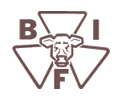Saturday General Session
Crossbreeding: Back to the Future
Abstract:
The value of crossbreeding to capture breed complementarity and heterosis has been well-documented by 50 years of beef cattle research. In particular, well-planned crossbreeding systems result in improvement in many of the lowly heritable traits that tend to be difficult to measure. These small, net positive impacts are particularly evident in traits like survivability, conception rate and age at puberty, along with a dramatic increase in longevity and lifetime productivity. The data are clear and irrefutable.
The emphasis on “value-based marketing” and emergence of vertically coordinated marketing systems in the beef business has caused many producers to question whether the economic return from crossbreeding may be offset by the perceived decline in consistency, uniformity and carcass merit. Data from a three-year study introducing Hereford genetics into a predominantly Angus herd to evaluate performance and economics suggest that the economic advantages to crossbreeding are real, even in a vertically coordinated system. In particular, advantages in feed efficiency, cost of gain and net return favored F1 steers in comparison to their primarily straightbred counterparts, although there was a definite reduction in quality grade. In addition, yearling heifer pregnancy rates were significantly higher in the F1 females.
The tendency in beef cattle research has generally focused on output based solutions — increasing (maximizing) single traits, rather than focusing on reducing input costs or maximizing profitability. Crossbreeding systems tend to be most effective in increasing net return, rather than major changes in any single trait. Effective crossbreeding systems can reduce inputs while increasing profitability.
Click here to view proceedings.
About the speaker:
Dave Daley is a fifth-generation commercial cattlemen from Butte County, Calif. He and his family (Cindy Daley, Ph.D., and three children) own and operate a commercial cow-calf and seedstock business based in Oroville, Calif. Daley presently serves as the president of Butte County Cattlemen’s Association and is active on state and national issues that affect the beef industry. Presently, Daley serves as the associate dean of the College of Agriculture and the director of the Agricultural Teaching and Research Center at California State University, Chico.
In addition, Daley is a professor of Animal Science and is responsible for the beef program at CSU, Chico. In that capacity, he also helped develop and mentor the Young Cattlemen’s Association.
Daley received his bachelor’s degree from CSU, Chico, and master’s degree and doctorate from Colorado State University. He has had a lifelong interest in all aspects of beef cattle production systems, and has been particularly involved in crossbreeding programs. For nearly a decade, Daley chaired a national group that focused on the use of composite cattle in commercial breeding programs. Daley has lectured throughout the United States and internationally on various aspects of beef production and continues to be actively involved in the California Cattlemen’s Association, National Cattlemen’s Beef Association and California Beef Cattle Improvement Association.
Editor’s Note: The above material is provided by and posted with permission of the Beef Improvement Federation. Please direct reprint requests to BIF via the “Contact BIF” page at www.beefimprovement.org.



